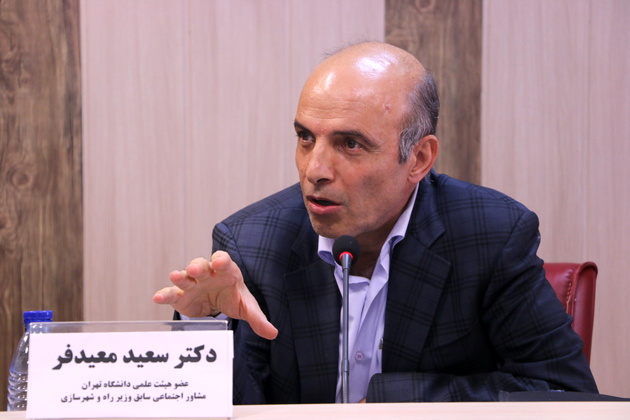
Individuals in Iran are obligated, not citizens; in conversation with Saeed Ma’eed Far, sociologist/ Siamak Malamhamedi.
This is a caption
[/caption]
This is a caption.
Siamak Malamhmadi
Dr. Saeed Meidfar, a sociologist and former professor at the University of Tehran, who also served as the president of the Iranian Sociological Association from 2004 to 2008, is now working as a social advisor to the Minister of Roads and Urban Development. Dr. Meidfar has numerous publications and articles in Persian and English in the field of sociology. Some of his works include “The Foundations of Social Theory”, “Sociology of Contemporary Social Issues in Iran”, and “Sociology of Social Issues in Iran”.
He discusses with the peace line, explaining the mechanisms that shape different lifestyles, and describes the dynamics of conflicting approaches between citizens’ ways of life and norms that the government intends to promote and impose. He states the truth that governments are products of their own circumstances and times, and if they are unable to adapt to new social realities and changes, they will face inevitable dangers that may lead them to internal disintegration or collapse.
As a sociologist, please explain how governance, in a general sense, interferes in the lives of citizens? And to what extent can these interferences be based on modern definitions of citizenship and governance?
From a sociological perspective, the most important factor in the formation of normative patterns and individual behaviors is primarily related to the field of social interactions. This is where humans interact with each other in the form of groups and social institutions, and ultimately these groups or social institutions impose systematic norms on their members. For example, membership in a social group such as a family may not always be voluntary, or in some other forms where individual membership is voluntary, such as various civil groups, educational or religious institutions, the individual may join for various reasons and act as an active member within that institution or group. Overall, all of these groups contain norms and behavioral patterns that members accept in order to be able to interact with each other, or are influenced by the beliefs and values of that social institution. Therefore, from a sociological perspective, there are factors that determine what kind of lifestyle, norms, beliefs and values individuals have, and whether they are loyal to them and act accordingly. This socio-biological
How do you define social mechanisms that lead to the production of lifestyle-related values?
The society in which we live, from the lowest to the highest levels, has components that influence individuals in some way. From a sociological perspective, each of us as individuals in society, in small groups to the society as a whole, perform four types of behaviors. One of these four types of behavioral characteristics can be economic in nature. Sometimes in our social relationships and interactions, we have economic motives. For example, in a family, each member has behaviors that are sometimes economic in nature; such as a father who must be the source of income, or children who are usually consumers in terms of economy. The second type is our values-based behaviors. Essentially, each of our behaviors is based on a certain set of values; such as religious values, or values set by a group or institution for an individual. We may have certain habits or religious customs, or specific beliefs that are prevalent in a group and act according to them. The third type of our behaviors can be social. Meaning,
Therefore, it seems that lifestyle – meaning the norms that people adhere to – is closer to personal preferences in democratic societies compared to non-democratic societies. As an Iranian, living in a society where I am, I am definitely more constrained in choosing my lifestyle compared to democratic countries. The choice of lifestyle in democratic countries is more individual-based, while in developing societies, it is more forced by social institutions. This coercion starts from the family and educational institutions, and extends to the government and authority. One of these governing institutions is the government. This is the same characteristic that has given more power to governments in countries like Iran – a developing country. The less developed a society is and the more central authority it has, the more control norms, values, and lifestyles have over individuals. In developed countries, individuals have more autonomy and more power of choice. We come to societies that may also have religious characteristics. In some developing countries – like Iran – religious institutions have been able to gain power. In
In a religious society, especially Islamic, can individuals be considered citizens?
In general, the more integrated the four behavioral categories – economic, moral, social, and power – are, the less individuals are free and more are forced. Consider a society like our own, in which religious government has taken shape and its economy is also of a governmental nature. The government practically wants all areas, legislation, and norms to be enforced through the state. It is natural that in such a society, the individual is not essentially free from the perspective of the government; rather, they are forced. As a result, in a society where the government has taken control of other components – such as economic, social, and moral components – we do not have something called “citizen” and individuals are, in a sense, “obligated”. The government wants to forcefully determine everything for them and bring them to happiness.
Of course, this is one aspect of the issue and we must also consider the other aspect. We must see to what extent individuals can be free from the control of government surveillance in societies like ours, where the government has control over all social elements. For example, the institution of family in our society has faced a serious confrontation with government control. In fact, families are in conflict with the government’s approach, which sees itself as active in this area. Today, the approach of families is challenging the government’s approach in those four areas. It can be said that despite its slogans, the government declares citizens as free and claims that individuals have the right to choose, but in reality, there is no such thing as a citizen in our society. But if we look at society, we see that individuals are active, because Iranian society is a society of action. For years, in our schools, in our educational institutions, and everywhere, they have promoted a specific lifestyle or defined certain values in books
How do the individuals who do not have opposition with the dominant ideology adopt and accept the dominant lifestyle, and how does this lead to pressure on other groups who do not have a relationship with this lifestyle?
In any period of time when a government is formed, it is related to the conditions of that period and has its own supporters. These supporters become dominant and gain enough importance to hold power in all social, political, economic, and cultural dimensions, like what happened in 1979 or fifty years before that when the Pahlavi regime was in power. All of these governments have had a relative level of acceptance. At least the majority of society remained silent and did not challenge these governments with their characteristics. Therefore, every government is close to the will of the people or the social will in a specific period of time. But considering that society is dynamic and gradually moving towards its own changes, a new proposal is formed. Imagine that when an existing institution exists, some people gradually position themselves against the previous situation and through this, they recognize themselves and take on their identity. They distance themselves from the existing institution and with this distancing, they continue to grow. Therefore, although the government still promotes and
In your opinion, how will the government deal with the large segment of society that is currently in conflict with the pursuit of their modern desires? Will it intensify suppression or ultimately adapt to a new, more compatible situation with these desires?
“It doesn’t matter who or what the ruler is. What matters is that the rule is a product of specific conditions in which the society represents itself and changes over time, distinguishing and transforming itself. Therefore, we reach a point where a large portion of society joins the group that desires change, especially the youth, academic and university groups, and then generation to generation, other groups such as grandparents join this change. As a result, the ruling elements lose more control and internal cohesion is lost. Eventually, we reach a point where there is a fundamental difference between the head and the body. Naturally, the head can no longer manage the body and control society. Therefore, the contradictions become more serious and the internal divisions within the ruling power deepen. In such conditions, any issue can be seen as a threat to the rule and anything can be considered a destructive factor. This is why rulers see everything as a security issue in the later stages of their rule. Fear and anxiety arise, to the point where
Thank you for the opportunity you have provided us with to engage in peace talks.
Tags
Lifestyle Monthly Peace Line Magazine peace line Saeed Maeedfar Siamak Malamhamedi Sociology پیمان صلح ماهنامه خط صلح